Labor's Gotta Play
Hardball to Win!
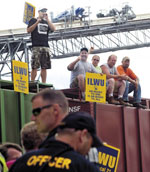
Showdown on West Coast Docks: The Battle of Longview
(November 2011).
click on photo for article
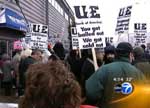
Chicago Plant Occupation Electrifies Labor
(December 2008).
click on photo for article
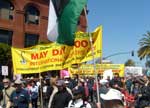
May Day Strike Against the War Shuts Down
U.S. West Coast Ports
(May 2008)
click on photo for article

May 2018
Organizing Workers Strikes
Against War and Repression
Lessons of the 2008 Longshore Strike Against U.S. Imperialist War
By Jack Heyman

ILWU contingent in San Francisco May Day march in conjunction with West Coast port shutdown against war and occupation of Iraq and Afghanistan. (Internationalist photo)
We reprint below an article first published in CounterPunch (1 May 2018).
May Day 2018 is the 10th anniversary of the longshore strike against the wars in Iraq and Afghanistan which shut down all West Coast ports from the Canadian to the Mexican border to demand the immediate withdrawal of U.S. troops. The shutdown and protest by members of the International Longshore and Warehouse Union (ILWU) was a stunning show of labor’s power and a call to action addressed to other unions and anti-war activists and drew much attention and support in the Bay Area and Seattle. It was the first strike action by U.S. workers against a U.S. imperialist war in 90 years.
 (Internationalist
photo)
(Internationalist
photo)And the effect of the 2008 strike continues to this day. On May Day 2015, ILWU Local 10 shut down the Port of Oakland and marched to Oscar Grant Plaza in front of City Hall demanding “Stop Police Terror.” Last year the Longshore Caucus with delegates representing all 29 West Coast ports, voted to stop work every May Day, the international workers day. This year the port workers are protesting in particular the police killing of Stephon Clark in Sacramento and Saheem Tindle, gunned down by BART police in West Oakland. Yet, when directed by the highest body in the union’s longshore division to take unified Coast action, the ILWU International officers have not mobilized the membership into action.
In 2008, the marquee on the Grand Lake Theater in Oakland proclaimed: “We salute the longshoremen’s May Day strike to protest the criminal occupation of Iraq.” Few unions aside from ILWU longshoremen actually took any action that day, but postal workers held “moments of silence”. The faculty union at the largest public university, the City University of New York (CUNY) called events in solidarity with the longshore workers. Unions from around the world sent messages of solidarity, as did the Vermont and South Carolina state AFL-CIO’s. As the Brass Band played The Internationale spirited demonstrators marched from the San Francisco longshore union hall at Fisherman’s Wharf along the Embarcadero, the site of historic maritime labor struggles. They were joined by other transport workers, like the Inlandboatmen’s Union, the Oakland teachers, S.F. State students, even the SEIU dancers from the Lusty Lady strip club and many others.
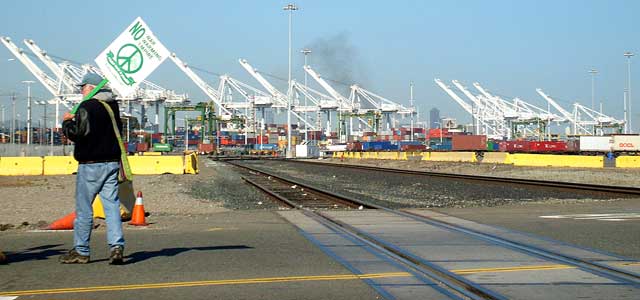
Harbor cranes idle and boomed up. Picket at entrance to rail yards at Port of Oakland during May 1 West Coast longshore port shutdown demanding an end to war in Afghanistan and Iraq. (Internationalist photo)
In the port of Oakland where all the cranes were boomed up in a salute to labor action, railroad workers honored anti-war picket lines at the vast intermodal rail yard and refused to work the trains. Undoubtedly the most action was the work stoppage by the Iraqi General Union of Port Workers who sent a solidarity message to the rally:
“The courageous decision you made to carry out a strike on May Day to protest against the war and occupation of Iraq advances our struggle against occupation to bring a better future for us and for the rest of the world as well.... We in Iraq are looking up to you and support you until the victory over the US administration’s barbarism is achieved.”
Clarence Thomas, a former Black Panther and member of San Francisco longshore union Local 10 had gone to Iraq during the war to express ILWU’s solidarity with Iraq port workers against the U.S. imperialist war and now they were returning that solidarity gesture by striking. Yet, U.S.-kindled conflagration continues to ravage the Middle East from Syria, to Iran, to Yemen, to Gaza and still Iraq and Afghanistan.
A Brief History of Labor Strikes Against Imperialist Wars and Reaction
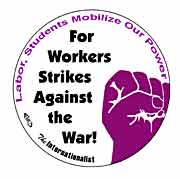
The 2008 U.S. West Coast longshore strike against war and occupation of Iraq and Afghanistan was not a unique event. There is a history of workers strikes against imperialist wars. In 1921, under the influence of the Russian Bolshevik Revolution, French dock workers refused to ship arms to suppress a rebellion by independence fighters in the Rif area of the French colony of Morocco.
After WWII when “Free” French troops were being transported back to Indochina attempting to re-colonize Vietnam, Laos and Cambodia, seamen who were members of the National Maritime Union aboard U.S. ships sent telegrams to President Truman protesting the imperialist venture. That was the first U.S. protest against that colonialist war. Later, the port of Marseilles dockworkers, members of the Communist Party-led CGT, refused to load war materiel on ships bound for Vietnam as Communist troops at Dien Bien Phu encircled and defeated French troops. A similar scenario prevailed in the French colonial war against Algerian independence.
While the U.S. imperialist Marshall Plan in Europe was being implemented, witchhunt hysteria was erupting in America. Communists were being jailed, deported and purged from U.S. maritime unions. The Communist-led Canadian Seamen’s Union strike was broken and the union destroyed. In the U.S. this dark page of history came to be known as McCarthyism. But the drive to purge “reds” who had built the unions was spearheaded not by right-wing Republicans like Senator Joseph McCarthy but by liberal Democrats, including inside the unions. The “red purge” was especially ferocious in the once militant Congress of Industrial Organizations (CIO). The only place in the U.S. where there was a successful protest of this anti-red repression was in Hawaii. When Jack Hall, the ILWU union official instrumental in organizing the islands, was arrested, accused of being a Communist, plantation workers, longshoremen, hotel and restaurant workers went on strike. Hall was released from prison the next day. Thus, imperialist war abroad was and is inextricably linked to capitalist class repression at home and labor strikes can stop it.
Perhaps the first and most spectacular strike by American workers against imperialist war occurred in 1919. In the midst of the civil war that followed the successful Russian workers revolution, Seattle longshoremen while loading a ship discovered that crates marked “sewing machines” were actually rifles intended for the counterrevolutionary White Army commanded by Admiral Kolchak in Vladivostok, buttressed by the U.S. Military Expedition there. The longshore union, in solidarity with the Bolshevik Revolution, declared it “hot cargo” and notified other ports of their strike action. The Seattle Union Record, newspaper of the IWW-influenced Labor Council, reported “Pacific Coast longshoremen will tie up the coast from Seattle to San Diego before they will load rifles or munitions for Siberia or any part of Russia….” Eventually scabs from the American Legion loaded the cargo but by the time the ship reached Vladivostok the port was in the hands of the Red Army, founded and led by Leon Trotsky, which had driven out the counterrevolutionaries and imperialist forces of which the U.S. military was part.
2003 Police Attack in the Port of Oakland: Prelude to the 2008 Anti-War Strike
After the 2001 terrorist attack on the World Trade Center and the build-up to war, the ILWU was facing hard-nosed longshore contract negotiations. The California Anti-Terrorism and Information Center threatened that any job action on the docks to support union negotiators or protest against the impending war could be seen as an act of terrorism. When it comes to class war at home or imperialist war abroad Republican and Democrats are of one mind. President Bush warned the ILWU that he would send in U.S. troops to occupy the ports to quash any job action. When the employers’ Pacific Maritime Association locked out longshore workers, California Senator Diane Feinstein, working in tandem with Republicans, implored Bush to invoke the slave labor Taft-Hartley Act. He did, forcing longshoremen back to work under the bosses’ yoke.
 On 7 April 2003, police (above) fired
point-blank at antiwar demonstrators and longshoremen at
the port of Oakland. (Tim
Wimborne/Reuters)
On 7 April 2003, police (above) fired
point-blank at antiwar demonstrators and longshoremen at
the port of Oakland. (Tim
Wimborne/Reuters)At the start of the war in 2003, a few thousand protesters chanting “War is for profit, workers can stop it” demonstrated in the port of Oakland. Police in riot gear, under the guise of fighting terrorism, attacked the protesters and longshoremen firing rubber bullets, wooden dowels, concussion grenades and tear gas canisters while motorcycle cops in brigade formation ran over protesters, as Czarist Cossacks on horseback had done 100 years earlier. Dozens of antiwar protesters and longshoremen were injured, some seriously. As the ILWU business agent on site, I was attacked by a squad of police, pulled from the car, pummeled and arrested. Democrat Jerry Brown, then mayor of Oakland, now governor of California, commanded the police who attacked demonstrators. The UN Human Rights Commission later characterized it as one of the bloodiest assaults against protesters, who were claiming that the war was based on lies asserted by the government and dutifully repeated by the mainstream media. The city of Oakland ended up paying over $2,000,000 to those injured by the police brutality. This police attack was compared to the police attack on maritime strikers killing two that provoked the 1934 San Francisco General Strike. On May Day 2008, longshoremen tagged the anti-war coastwide strike action “payback.”
Organizing the 2007 Longshore Workers Anti-War Conference
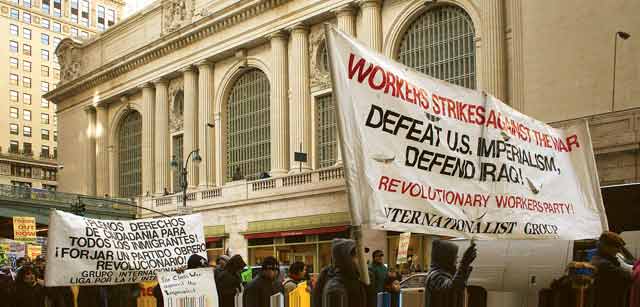
Internationalist contingent calls for workers strikes against the war in New York antiwar march, 18 March 2006.
(Photo: Sue Kellogg)
The Pacific Maritime Association (PMA) appealed to the industry arbitrator to stop the 2008 action. Twice the arbitrator ruled that the work stoppage would be illegal. Twice dockworkers stood defiant in their determination to carry out what many believed was to be the first anti-war strike in the U.S. history.
Where did this workers’ intransigence come from? The anger brewing from the police assault was necessary but not sufficient by itself to organize the action.
In fact, from 2003 on, almost every year a resolution was presented calling for a coastwide port shutdown against the war on Iraq and Afghanistan. Almost every year, it passed the historically militant Bay Area Local 10, only to be “deep-sixed” (buried) or voted down in the Longshore Coast Caucus. But after 2006, something changed, which we who were fighting for labor action against the war didn’t pick up on right away. Many port workers, solidly against the war from the start, thought of it as “Bush’s war,” as the antiwar movement proclaimed. They figured that if the Democrats got in, the war would stop. After Bush was reelected in 2004, in the 2006 mid-term elections the Democrats won control of both Houses of Congress. But nothing changed in the war. In fact, it intensified with the so-called “surge” killing tens of thousands of Iraqis. So by 2007, there was a sea change in the mood of the longshore ranks.
So, many longshoremen figured, if the Democrats aren’t going to stop it, it’s up to us. At the Coast Caucus in June 2007 we saw the possibility that the “strike to stop the war” resolution could finally pass. The call for labor strikes against the war had been first raised earlier by the Internationalist Group to longshore workers. Now that it seemed concretely possible, we were concerned that the Bay Area local, the militant and only predominantly black local in the ILWU, could be isolated. So we pushed for Local 10 to call an international “labor against the war” conference in San Francisco at our union hall to back up the call to action.
Speakers at the conference included Labour MP Jeremy Corbyn, Alexander Cockburn, then-editor of Counterpunch, Bob Crow, General Secretary of the Rail, Maritime and Transport Union (UK), Robert Mashego of the South African Transport and Allied Workers Union, Takumi Shimizu of Doro-Chiba, the Japanese Rail Union, and longshore union leaders. With workshops like “Class Struggle and the War,” and “Soldiers Organizing Against the War” participants were steeled in the lessons of working-class struggles. During the conference feisty members of Code Pink announced that they were going to picket the docks. Longshoremen, Leo Robinson and Howard Keylor, organizers of the longshore 1984 anti-apartheid ship boycott, took the deck to explain that the best way to organize an effective action is for the workers themselves to raise resolutions at their union meetings to call for strikes against the war at the point of production where workers wield the real power. Substitutionalism, they argued, doesn’t work. That resolution passed overwhelmingly with the support of the Code Pink sisters.
A few months later, at the Local 10 membership meeting a resolution was passed to go to the Longshore Caucus, in which elected delegates from all 29 West Coast ports meet to discuss the pressing issues of the day. Bob McEllrath, the International President, and other officers of the union knew ahead of time which resolutions had passed the locals. They didn’t want the Local 10 resolution to pass, afraid that shutting down all West Coast ports to oppose the war would interfere with contract negotiations. McEllrath’s backers in Local 10 tried to stop its chances of passing the Caucus by reducing the usual number of delegates to exclude the maker of the resolution. Although they were able to keep out the messenger they didn’t kill the message because by then it had resonated deeply in the ranks.
At the Caucus, when Local 10 delegates presented the resolution, former International President David Arian from Los Angeles Local 13 and other officers spoke against the resolution warning that a coastwise job action would imperil contract negotiations. But then Vietnam veterans hit the mike and suddenly the momentum of the entire debate changed. A vet from Seattle and another from San Francisco passionately agreed with the anti-war resolution, saying that workers had campaigned for Democrats who promised to end the war but were betrayed as the war continued with working-class youth being used as cannon fodder to fight another rich man’s war for oil. They argued that workers, by shutting down the coast for 24 hours and stopping global trade, could show the working class the power they have at the point of production to stop the imperialist slaughter.
It was contagious. Delegate after delegate joined in supporting the resolution. When McEllrath saw the tide turning against him, he asked the delegates to reduce the action to one shift instead of the entire day. The resolution shutting down the whole West Coast passed overwhelmingly. Even then there was bureaucratic resistance. The president of the largest local on the Coast, Local 13, let it be known in days leading up to the May Day port action that he wasn’t going to shutdown Los Angeles/Long Beach. The International tops saw that that would divulge weakness and undermine contract negotiations. All West Coast ports were shut down tight. Shipowners, terminal operators and stevedoring companies were forced to concede to the power of the union.
The International bureaucracy kept trying to sabotage the action right up to May Day. As a last ditch effort “Big Bob” McEllrath tried to turn the anti-imperialist strike which demanded withdrawal of the U.S. military into a patriotic parade calling for supporting the troops, i.e. the Pentagon brass. This was directly contrary to the Caucus resolution itself. In Seattle a sea of American flags were waving. Not so in San Francisco. Marchers, the heart of the action, were adhering to the resolution for troop withdrawal. We were prepared to explain to marchers that the Iraqi port workers were striking in solidarity and that if they saw the American flag being carried, they could think it was directed against them. But all along the march you couldn’t see a stars-and-stripes. Instead marchers carried the red-lettered May Day banner “No Peace, No Work” to the tune of The Internationale, the anthem of the international working class, and the solidarity message from the striking Iraqi port workers was read to an enthusiastic rally.
Linking the Class Struggle to the Fight Against Imperialist War
At the same time as the 2008 May Day strike and march against the war, an economic crisis was brewing across the U.S. With the housing bubble bursting and more generally the continued falling rate of profit the capitalists’ intensified a general assault on workers-- their wages, social benefits, working conditions and jobs. The “too big to fail” bailout of the banksters and automakers “socialized” losses for the capitalists while working people were thrown out of work and out of their homes. It exposed the corruption in both capitalist political parties, Democrat and Republican. The bailouts resulted in a redistribution of wealth upwards from labor to capital, i.e. a transparent theft of wealth to the upper echelons of the capitalist class using fraud and force. Over half of the wealth of African Americans was stolen through the loss of homes and jobs while a black president was sitting in the White House. Neoliberal capitalism has meant bailout for the capitalists and brutal austerity for the working class and oppressed.
Yet, there has been virtually no labor fight-back because the trade-union bureaucracy and, in Europe, the social democracy have collapsed in the face of this neoliberal capitalist attack. Worse yet, they’ve become the cheerleaders and enforcers of these new social contracts. Here’s a litany of betrayals: IAM bureaucrats forced a revote of a rejection of the Machinists’ concessionary contract until the members got it “right.” UAW bureaucrats collaborating with the automakers have held wages down, imposed a tier system in a pathetic and failed attempt to organize autoworkers in the South. ILWU President McEllrath ensured the EGT grain contract was ratified without a rank-and-file vote and without effectively stopping the scabbing. He surrendered the union-controlled hiring hall and grievance machinery.
Now we are seeing a bright light on labor’s horizon, teachers’ strikes in West Virginia, Kentucky and Oklahoma. Government workers fighting austerity can be contagious and could spread to other sectors of the working class. But the labor bureaucracy still acts as a brake on these struggles and an obstacle to workers’ victory. In France railroad workers have taken the lead in fighting the austerity measures of banker-President Macron. Over the last 15 years port workers led by the International Dockworkers Council have been organizing protests against neoliberal capitalist port privatizations at the European Parliament in Strasbourg. But in crucial battles such as in Greece, the unions have failed to use their power to occupy the docks to spike these assaults. And the result is one defeat after another.
Until a fighting leadership can be forged with the program and guts to fight for the interests of working people and all oppressed sectors through to the end, the promise contained in the 2008 May Day West Coast port shutdown cannot be realized. That means ousting the “labor fakers” who tried to prevent, then undercut and then divert this signal example of militant class-conscious workers action.
Today, we are witnessing an intensified inter-imperialist rivalry in Europe and imperialist provocations most apparent in the Middle East with Trump’s recent attack on Syria, his blood-curdling threats to wipe out North Korea, his attempts to strangle Venezuela and U.S. neocolonial military intervention in Africa. In every single case, the imperialist marauding of the Republican Trump has been backed and even spurred by the Democrats. The fact is that these machinations are rooted in the dying capitalist system.
Clearly, fighting for capitalism’s elimination must be the point of departure for the working class and the left. But there is no mass political party to represent workers in this struggle in the U.S. “Socialist” Bernie Sanders only serves to rope potential dissent back into the Democratic Party. In Britain there is the reformist Labour Party and in Brazil, the reformist Workers Party, both of which have carried out the bosses’ attacks on the working class, although perhaps not as successfully as more right-wing sectors had wished. The crisis in working-class leadership is clear as day. What’s needed here and now is to oust the bureaucrats, break with the Democrats and build a class struggle workers party that will mobilize for workers struggles, for immigrant rights, women’s rights and against racist police and fascist attacks.
At the April 15 Oakland antiwar rally billed as “No to U.S. Wars at Home and Abroad” barely a reference was made to the working class. There was not one speaker representing a trade union. And this happens repeatedly at U.S. antiwar events. On this May Day, longshore union Local 10 will be organizing a rally in the port of Oakland calling for “Workers Rights for All!” and “Stop Police Repression.” Three longshore union members in the Bay Area have had sons and a nephew killed by police recently, one black, one Latino and one white. The latest, Sahleen Tindle, was killed by BART transit police in January. This local, which overwhelmingly rejected a contract extension pushed by PMA employers and ILWU International Officers, is now shutting down Bay Area ports to protest police killings, just as they did in the 1934 Big Strike. The struggle against capitalist class repression at home is directly linked to the struggle against imperialist war abroad. As demonstrators chanted at the start of the U.S. invasion of Iraq, “War is for profit, Workers can stop it.” And longshoremen replied “No Peace, No Work!”
Jack Heyman, a retired Oakland longshoreman, has been
organizing ILWU union protests since the 1984 South
Africa ship boycott to protest apartheid. His 2008
Longshore Caucus resolution sparked the anti-war West
Coast ports shutdown. He chairs the Transport Workers
Solidarity Committee (www.transportworkers.org).